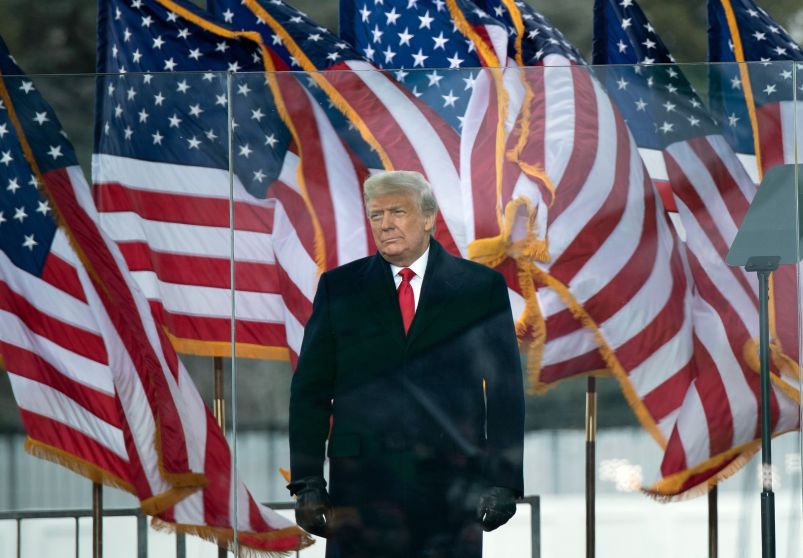Special Counsel Jack Smith on Tuesday obtained a superseding indictment charging Donald Trump with the same four counts relating to his 2020 coup attempt that a grand jury leveled at Trump in 2023. The new indictment marks an attempt by Smith’s office to move forward with the bulk of its case intact after the Supreme Court declared that the vast majority of presidential actions are immune from prosecution.
Smith spokesman Peter Carr said in a statement that the indictment was obtained from an entirely new grand jury, and demonstrates prosecutors’ efforts “to respect and implement” the Supreme Court’s immunity decision.
The retooled indictment brings the same four counts against Trump: conspiracy to defraud the United States, conspiracy to obstruct an official proceeding, obstruction of an official proceeding, and conspiracy against rights. But it reflects the resounding defeat that the Supreme Court dealt to efforts to hold the former President and those around him accountable for his attempt to undo his 2020 loss. Sixteen paragraphs describing the scheme to enlist the DOJ in the coup attempt have now been deleted, along with references to a DOJ official that the earlier indictment called “co-conspirator 4”: former acting assistant attorney general Jeff Clark.
Overall, the superseding indictment emphasizes that Trump was not acting in his official capacity as he searched for various ways to stay in power after losing the 2020 election. When a person was acting within the bounds of his official capacity in denying Trump, the new indictment makes that clear: a new paragraph at the top says that Trump “tried — but failed — to enlist” Vice President Mike Pence in the conspiracy, while specifying that the Constitution meant that Pence only played a “ceremonial role” on Jan. 6.
The revised document retains meaty allegations against Trump, including accusations that he convened fake elector slates to provoke a “fake controversy” in Congress and that he pressured Pence to break the law by changing the vote totals during the January 6 certification session. It’s not clear that the changes will survive further Supreme Court review; the high court majority signaled in very clear terms in its immunity ruling that it’s willing to break with its stated approach of textualism if it means protecting Trump from further criminal prosecution.
While the John Roberts-authored decision was often vague when describing how far official conduct extended, it was explicit about some things that were official conduct, seemingly alluding specifically to the Clark episode at the DOJ, which, the majority found, very likely fell within that immunity bucket. Trump, Roberts reasoned, could discuss “potential investigations and prosecutions with his Attorney General and other Justice Department officials” as part of his “constitutional duty to ‘take Care that the Laws be faithfully executed.’”
The Court, among other things, held that official acts cannot be used as evidence.
Smith had surprised observers after the July 1 ruling came down by asking for a month-long delay of a pretrial status report, which is now due on Friday. The next hearing in the case will be on September 5; Trump has said that if he wins the November election, he will have the Justice Department throw out the case.
The new indictment contains several new lines that seemingly address the Supreme Court restrictions head on. At the start of one section about Trump interfering in state election results, prosecutors wrote that Trump “had no official responsibilities” related to states’ election certifications. In a section addressing the fake elector scheme, prosecutors write that Trump “had no official responsibilities related to the convening of legitimate electors.”
None of the alleged Trump co-conspirators, Smith now emphasizes, were “government officials during the conspiracies” and all of them “were acting in a private capacity.”
Pages of allegations over Trump’s efforts to direct the DOJ to support his attempt to stay in power are now missing from the charges.
Some elements of the new indictment seem tighter than the original. Smith adds concrete dates in several places. Rudy Giuliani, referred to in the indictments as “co-conspirator 1,” is now described has having been “put in charge” of the Trump campaign’s litigation efforts.
Trump, a newly added line in the superseding indictment says, made “false claims” about the election that were “unsupported, objectively unreasonable, and ever-changing, and the Defendant and co-conspirators repeated them even after they were publicly disproven.”
Read the superseding indictment here:







Yay! Jack for AG. The perfect addition to Kamala’s cabinet
Nice to know that Don the Con has something to look forward to. He’ll be needing things to occupy his time in his less than golden years.
so unfair ™
Wow, Josh is going to make “balls and strikes” Roberts big mad with this completely accurate statement
So government officials who conspire to revolt with a POTUS are protected, only private conspirators like Giuliani need to worry, is that it?
“Quick, Don – this way!”
#NoEscape